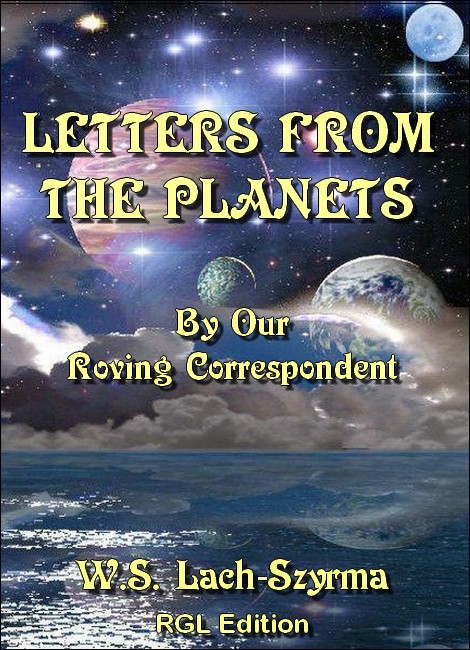
RGL e-Book Cover©
Roy Glashan's Library
Non sibi sed omnibus
Go to Home Page
This work is out of copyright in countries with a copyright
period of 70 years or less, after the year of the author's death.
If it is under copyright in your country of residence,
do not download or redistribute this file.
Original content added by RGL (e.g., introductions, notes,
RGL covers) is proprietary and protected by copyright.

RGL e-Book Cover©


The Reverend Wladislaw Somerville Lach-Szyrma's first book on interplanetary travel, A Voice from Another World, appeared in 1874. It was published by James Parker & Co., London, the author being identified only by the initials "W.S.L.S."
A revised and expanded version of this work was published in 1883 by Wyman & Sons, London, under the title Aleriel, or: A Voyage to Other Worlds.
After the appearance of the second edition of Aleriel in 1886, for which he wrote a new preface, Lach-Szyrma continued his literary exploration of the solar system in a series of nine stories published over a period of several years in the British monthly Cassell's Family Magazine under the general heading "Letters from the Planets."
In 1972 these stories were collected, together with other examples of Victorian and Edwardian science fiction, in Worlds Apart. An Anthology of Interplanetary Fiction (ed. George W. Locke, Cornmarket Reprints). The RGL e-book Letters from the Planets offers the original illustrated stories from Cassell's Family Magazine in a separate volume.
In 1892 Lach-Szyrma followed up with another book of interplanetary adventure, Under Other Conditions. A Tale—a reprint from the British periodical The Western Magazine and Portfolio (date not ascertained). This volume was published by Adam & Charles Black, London and Edinburgh.
—Roy Glashan, 23 December 2020.
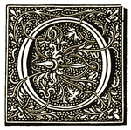
NE fine morning, not being pressed with business, I resolved on a walk on Penmor to see some archaeological remains which had been recently discovered there, and which, thoughthough I had already once visited, yet I had never properly inspected. It was a fine, cheery May morn. The dew was on the heather; the golden gorse looked bright in the glowing sunshine.
As I left the last cottage and granite hedge, and pushed out into wild nature, I do not know how it was, but thoughts did come before my mind of that stranger from another world who once on that very moorland had shown himself to me, and told me strange things that seemed still as a dream. Where was he? Had he remembered me? The letter I had received, that he had last been seen in Switzerland (on his second visit in 1883), on the Jungfrau, was in my pocket. I read it over. It was manifestly no mere delusion of mine, but there had been a visit not only of one, but of three visitors from a sister world to our planet.* I wonder if three people could be deceived into a common fancy that they had talked with beings not of the earth earthy, and yet not spirits, but of material bodies, and in some degree human.
* See Aleriel; or, a Voyage to Other Worlds, pp. 203—213.
As I walked on in the bright sunlight, other thoughts came on me, and I began to turn my mind to the subject of my search, the newly-discovered cromlech. I need not detain my readers with the account of the cromlech, a description of which is to be given in a paper in a London archaeological society. All I will say is that it was very interesting, and deserved my walk.
As the day was very pleasant, I resolved to go on further to the Nine Maidens, a circle which old antiquaries used to call Druidical, but which it is now the fashion to consider as the border of an antique sepulchral barrow. I mounted the ridge on which it stood, and looked for a moment on the glorious view of sea and moorland. Then stepping up to the circle, I was struck by the fact that the eastern stone—a huge, flat, granite block—had been broken in two, and in part pulverised by some tremendous force, like the explosion of dynamite, or the blow from a heavy cannon-ball.
"What a mischievous age this is!" I cried aloud—"Even these granite blocks are not safe. Some wretched miner has blown up the slab with dynamite." But on examination it hardly looked like an explosion, but the blow from some powerful projectile that had smashed the slab.
I was going away disheartened at the mischievous propensities of our age, which are destroying some of our most valuable ancient Cornish monuments, when I noticed a few yards off a small slanting tunnel (in the ground, and apparently cutting into the solid granite rock) of a few inches diameter. I approached it, and pushed into it with my stick as far as I could, but in vain; I could feel no bottom; then I tried to look into it, but it was all gloom. Could it be connected with the smashed slab? I took the measures. It was exactly such as a projectile striking the slab would pierce into the earth. What could it be? Could it by any means be connected with the mysterious friend I had met on the moor? I was burning with curiosity, but alone could do nothing, so unwillingly I had to return home to think over this curious discovery.
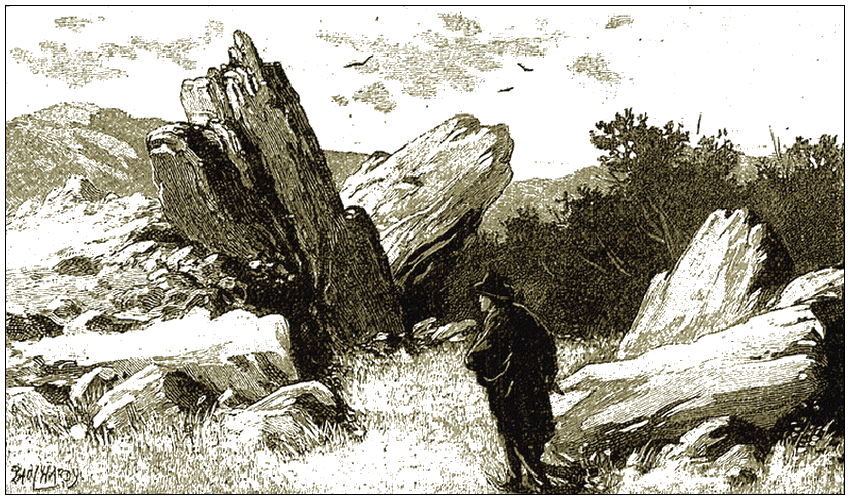
The Post-Office.
AFTER dinner I resolved to go down to the village and seek the aid of Thomas Tremeer, an intelligent miner, to work out the problem with me. I found Tremeer at home.
"Do you know," I asked, "that the east stone of the Nine Maidens is smashed up?"
"Don't you say so, sir! It must have been a hard job to them as did it; but you can't tell what chaps will do with dynamite nowadays."
"But the odd thing is that it looks as if it was hit off—not blown off."
"You don't say so, sir! What can it be?"
"Well, Tom," I said, "suppose you and I go up and see for ourselves; you take a pick and a couple of dynamite cartridges, and we'll see into it."
Tom promised to go with me on the search.
I had a sleepless night, wondering over my discovery.
The morning came at length, and after breakfast I found Tom in the kitchen ready for the trip, with his pick, borer, and, I presumed, cartridges. We started for the walk, chatting over the little gossip of the village; but as we approached Penmor, I grew more and more anxious and interested, and found a difficulty in talking of anything. We seemed to get on so slowly over the surface granite. In time, however, we were there. Tom examined the place. To his practised eye it was clear that no dynamite explosion had done the damage, but that it was the work of some projectile which had embedded itself in the rock. Without discussing the possibility of such a theory (as I suppose on some philosophers' principles we ought to have done), we set to work to open up the mysterious little adit or tunnel. It was tough work, for beyond a thin layer of turf there was solid granite. The dynamite cartridges had to be used, and I with Tom got under a projecting rock some yards distant for the explosions. At length the tunnel was opened out for about three yards, and then Tom, with his borer, released from the rock a curious conical bolt of steel, on which, to my utter astonishment, I saw deeply indented, in clear Roman letters, my name and address.
Tom read them. "It is for you, sir, certainly," he said, "but who can have put it here?"
I told him whom I suspected, and the wonderful story of Aleriel and his visit to our parts. He looked amazed and somewhat frightened, but I told him it was no witchcraft, for my singular friend was not at all wicked, but seemingly very good and pious, though certainly in a strange way. However, I took the bolt, and looked over it for an opening. The thicker part had a sort of red seal of lead upon it. This, I thought, was the opening. With the aid of the pick we pulled it off, and then inside we found a crystal cone, of about three inches diameter, embedded in the steel projectile. This cone I pulled out, and in the crystal I noticed two folded letters separately buried in it. I did not like to break the crystal at once, so I resolved to take it home and examine it.
I came home and examined the crystal carefully. It was evidently a solid block of something like glass, into which the letters had been placed when in a molten state, and they, therefore, could not possibly be reached without breaking the crystal into pieces. After some scruples I broke it with a bar of iron, and the letters fell at my feet, and I found each of them addressed to me, and the word Aleriel written across each address.
I opened the first. It contained a curious tale, which I here give: an account of an ancient lunar city.
AS we approached your satellite, the moon, we selected the ring-mountain Arzachel, in the Great Crater Chain, for our landing-place. It was a grand and awful scene of desolation; my companions were struck by its still grandeur. It was night, and the stars shone like brilliant points in the black sky; while the earth moved as a majestic globe, shining with its pale earth-light on the terrific precipices and cliffs and peaks of Arzachel. We waited here an earth-day, and then suddenly the glorious sun lighted up one of the loftiest peaks of Ptolemaeus in sight in the distance; then peak on peak was illumined. The intense cold of that worse than Arctic night was succeeded by burning heat. The mighty sun soon blazed upon the awful gorges and clefts of the mountain, and it was day.
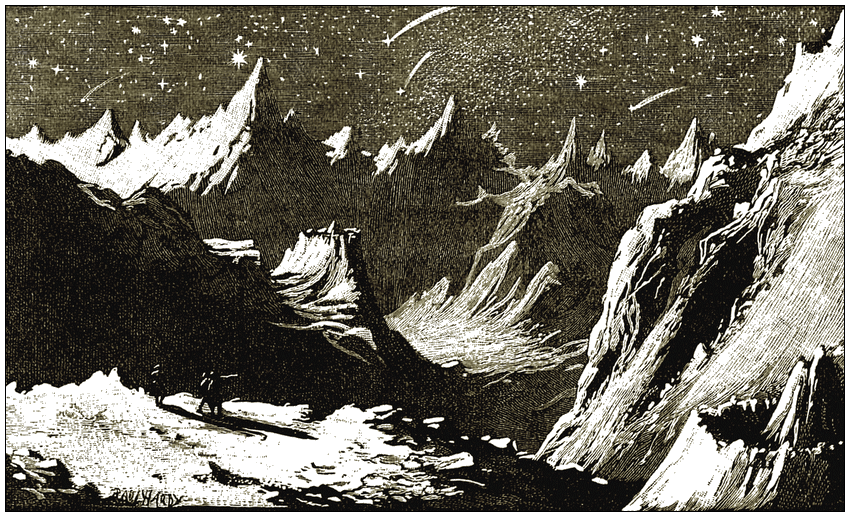
A Moonscape.
We looked around us and walked from our ether-car down the rugged slopes of Arzachel. Suddenly a block of stone perfectly squared caught my attention.
"Can that be a work of nature?" I said, "It looks wrought by industry."
Ezariel examined it and said, "It may be true, then, as our sages suppose, that this dead world has once been the abode of intelligent immortal spirits enshrined in corporeal bodies. Is it only a used-up, a ruined, a destroyed world? Are these vast and terrible mountain ranges only memorials of the vast convulsions that once destroyed life here?"
We agreed to search, if not for living beings (for none such even of a low type seemed to survive upon the lunar surface), at least for remains of intelligences that once may have dwelt there. We searched Arzachel for about three earth-days, but found nothing. It was terrible to walk on a world that one had thought had never known life, but still more awful to traverse one where life had been, but had become extinct.
Finding nothing more on Arzachel, we agreed to proceed to Ptolemaeus. But in vain; there were no signs of life having existed there. So we went thence over the Sinus Aestuum to the great circle of Copernicus.
At length, here, near the central cone of Copernicus, I noticed a massive rock, which seemed smoothed by something more than the volcano or the earthquake. I drew near it. It was the opening of a cavern. I entered it, and, causing light to shine around me, followed by my companions, I pierced its depths. Along the wall we traced on either side quaint and curious figures, evidently chiselled and not the work of nature, and strange hieroglyphs cut into the rock. I cannot describe to you these lunar caverns and their sculptures. They had apparently been saved from the great catastrophe. They were very quaint and unearthly, but perhaps depicting scenes on the lunar surface when seas and continents existed there, and living beings dwelt upon the moon. They showed intelligence, but were inferior to your better and more civilised works on earth. If I could liken them to anything I have seen on earth, it would be to the buried cities of Yucatan or the vestiges of the Peruvians.
Those American remains also were records of lost nations, but these of a lost race—a race that had died out or been extinguished on this now dead world.
When we had copied these strange designs by photography, we emerged from the cavern into the bright sunlight. Then around the cavern I thought I could trace terraces and Cyclopean rocks piled into the walls of an ancient city of this lunar race which had passed away for ever.
"Thus," I cried, "perchance in ages to come may travellers in space, visitors from another planet, wander over the earth, and wonder at the ruins of London or of Paris and the remnant of man's civilisation, and conjecture what kind of being man could have been when he lived upon the earth, and what sort of world the earth could have been in the ages when it was fit for supporting life."
There they stood, those massive walls of the Copernican city, rent and torn by physical forces of destruction, yet showing that once even in that wild region intelligent life had been.
After we had examined these remains, we proceeded to the grand mountain Aristarchus, glowing in the sunlight with its huge white cliffs. We have searched this region also. In a gorge of Aristarchus, perched on a ledge in the rock, I traced the relics of another city, in a better condition than the first; long walls of white stone, terraces well built, but broken in many places, the debris of ruined towers, streets upon streets vaguely marked in ruins, squares, Cyclopean edifices could dimly be traced. Amid the fractured stones were curious pieces of wrought stone quaintly cut, which might have been ornaments of the Lunarians.
"Here, even here," I cried, "once has been life. It is a dead world now—a desolate realm of death, but it is only a world in which life has been extinguished. Who were the Lunarians? what was their form? were they like men, or of what class and order in creation?" No answer, could I find to these questions. The shadows of the lunar night suddenly closed in. The white peaks turned black, the earth shone forth in the starry sky, and intense frost bound all things. The lunar night had begun. Farewell!
Aleriel

EAR FRIEND,—I have thought of mentioning to you one of the sights I saw on Mars, which may interest you, and be of use as suggesting what man might effect if only he learnt wisdom. Your Arctic regions are useless; left to the Polar bear, or the whale and walrus. Man's dominion does not extend to them, even to those realms nearest to the most cultured lands of Europe. As for your Antarctic regions, you actually know less of them than of the Antarctic realms of Mars, for these you can see in your most powerful telescopes—you can at least discern the outlines of land and sea. But of the Antarctic realms of the earth no man can tell whether they are land or sea, whether the Antarctic continent is a fable or a fact, though probably it is the former. When I arrived at the Mitchell Mountains, in the Antarctic zone of Mars, I was struck with the vast scene of icy desolation there—very like the mountain regions of Greenland, only that the sea around was green, and not blue. After traversing some hundreds of miles of their snowy peaks and cliffs, and magnificent wild Arctic scenery (not unlike the Arctic scenery of earth), I was suddenly struck with the sight of a trail of rich red vegetation of several miles in the midst of the eternal snows. I approached with curiosity this oasis in the frozen desert. As I approached I felt the air suddenly grow less icy, or rather the icy blasts were relieved by warmer air currents, and these currents seemed to rise from what appeared to be a huge crater of a volcano (very like the volcanoes of earth or the extinct ring mountains of the moon, and, on a smaller scale, like our ring mountains). "Surely," I thought, "here is volcanic action." Still I noticed no eruption, nor geysers, nor lava current.
The night came on. The Martian moon Phobos was dimly visible near the horizon. All else was dark and calm, save the stars above. From an opening in the mountain, in the very centre of the warmer oasis, a light issued; but not the ruddy light of molten lava, nor sulphurous flickering flame, but the calm white electric light. It appeared issuing from the ground. I approached, and then I saw it came from a vast chasm, which, however, was not opened perpendicularly down into the depths, but seemingly sloped downwards into an angle. As I drew near, I noticed some hundreds of Martians busy about the opening.
It was difficult to enter the chasm without being perceived, but as I noticed the electric light only illumined well the lower part of the slope—i.e., that near the ground—and that the overhanging rocks were at a great height in comparative darkness, I resolved to make the attempt.
I flew in the shadow right into the tunnel. Then I felt the air was warmer, and as I went on, going onward and onward, it grew warmer and warmer still. I flew forward thus several miles, the tunnel manifestly sinking deeper and deeper by its decline in the slope. The light was less, and the electric lamps grew further and further apart. By them, however, I noticed cars of the Martians hurried forward into the tunnel, and descended by it deeper and deeper into the planet's interior. It was, in fact, like a huge adit of a colossal mine.
So I thought for a time that it might be, until having gone some ten miles into the huge tunnel, and I should think some three or four miles down into the depth of the planet, below the level of the Arctic Sea, I came to a gigantic cavern about a mile high, and the limits of which I could not see on any side. Before me was a huge lake of evidently half-boiling water, through which there flowed a stream of burning lava, or rather that liquid rock which in Mars represents the lava of the earth.
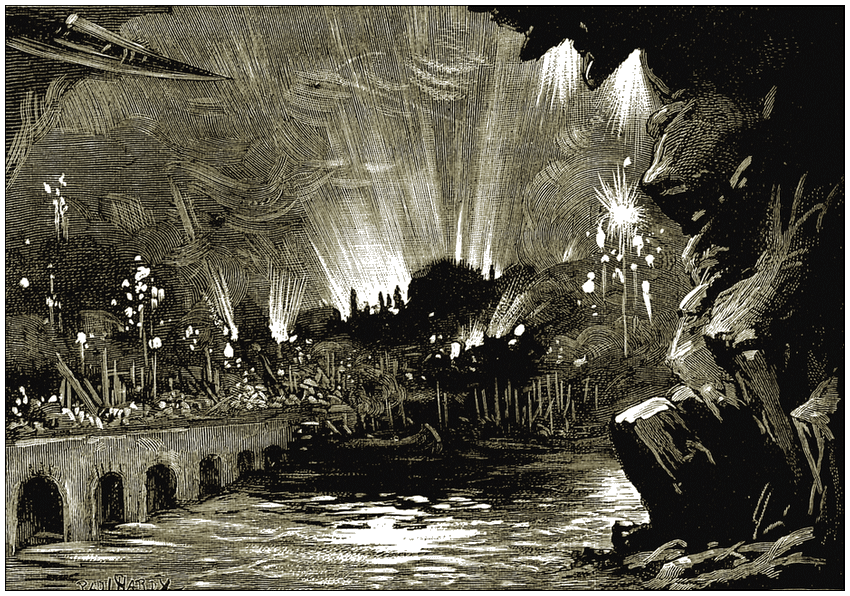
I came to a gigantic cavern.
Through this lake there was a huge causeway, on which the Martian cars were carried onwards with their living freight. I flew onwards over the lake, and here and there on its dark steaming waters were the electric ships of the Martians, while in certain places lighthouses were placed, which gave with the blaze of their electric lights a calm to a scene which otherwise might have been terrible. I followed the line of the causeway, and came at last to a shore, where was a well-illuminated city.
Here were hosts of factories, of vast machines, of smelting operations, of huge furnaces, deriving heat from the great lava streams issuing out of the depths of the planet. The air, instead of being cold, as on the surface above, was heated. Busy works were going on, and myriads of the Martians could be seen following in the city divers industries. It was a wonderful scene of activity.
When I looked at it, I thought, "Is not this more advanced planet representing to me what in future ages may be seen in the Arctic regions of the earth? Those realms are now cold, bound down, and frozen with intense eternal cold. They are useless to mankind. Yet if the surface be so frozen, it does not follow that the depths are so likewise. Nay, Hecla itself teaches how beneath frozen Iceland is a region of eternal fires of burning heat, such as might smelt all the metals of Birmingham.
"On earth man leaves these Arctic regions waste and barren, because he confines himself to the cold frozen surface; but the Martians are wiser—their Arctic regions, indeed, are even colder than those on earth, but they can obtain heat beneath the surface. A few miles below Siberia or Labrador are regions hotter than man can bear. I have met miners on earth who, in latitudes north of 50° on earth, have told me that in the coldest winters, when the surface of the earth is frozen and covered with the white snows, they have been so hot that they have had to labour with their clothes off, almost naked, on account of the heat. Why not utilise these subterranean fires? Underneath Manchester or Glasgow, or far colder regions, are subterranean fires, more potent than all the coal of the Lancashire or Staffordshire coal measures could produce. Intense heat is to be found a mile or two beneath earth's surface. Why should that heat be all useless? How absurd of man to lament the chimerical trouble that the coal measures can be exhausted by human industry, when the earth's heat alone offers a greater heat than the burning up of all the coal measures of their world can produce; just as the force of the tides of earth's oceans, now utterly wasted, even in England itself, could produce a thousand times greater power (capable of being converted into the master-force of electricity) than all the steam-engines of earth could produce—a mighty, almost immeasurable force!"
In those regions not far from the Mitchell Mountains in the hilly country of Cassini Land, I saw another quaint scene no less wonderful, which may be regarded as the natural outcome of the immense power over nature (to mould it to their will) which the Martians possess, and which man may in time attain when mechanical arts are further advanced than they are now, should the instinct of mound-building ever revive on earth. I noticed in those more favoured regions of the Martian south temperate zone, as I approached Cassini Land over the green waves of the Zollner Sea, what looked like colossal statues of gigantic Martians, several hundred feet high. These enormous statues struck me as very singular. I approached them and saw that they were natural hills cut into shapes of gigantic size many times larger than the huge Colossus of Rhodes, or the figure of Liberty at New York. In one case, indeed, a gigantic crouching figure was so vast that its head was surmounted with a crown, within the border of which a little city had been erected. Another hill was cut into the form of one of the Martian trees, and on each leaf there stood a house, looking like a flower or bud. In another hill two projecting peaks had been fashioned into two hands, and in each hand a house was built. "Here," I thought, "is something of the state of things that might have even now occurred on earth, had the present civilised inhabitants shared the desire of moulding hills into the form of natural objects which once existed among the Mound-builders of Wisconsin and Ohio. Had those Mound-builders, instead of being exterminated by superior races, left descendants capable of carrying out their ideas and of utilising the Steam-engine, and dynamite, and the various forces of civilisation, what a strange land of wonders the Western States of America would have been! Almost as wonderful as Cassini Land in Mars. But the European builds for himself, as the ancient American tried to fashion natural objects to his own uses; the European having conquered, the American ideal has never had a chance of being carried out on earth."
I saw many wonderful engineering works on Mars—huge canals and causeways, and coasts rounded of their promontories (blown away by explosives)—such as I should think the astronomers of earth, if they have not yet seen them, must surely observe before very long.
Aleriel

READ and re-read my strange letters. Should I ever hear more from my unearthly visitor? How could he again send to me, when he was some thirty millions of miles off in the planet Venus, or would his powers reach so far as to transmit to this little spot of earth a bolt such as he had certainly been able to hurl from Mount Aristarchus on the Moon?
I was much interested in the matter, and often thought of my strange visitor and his still stranger letters from regions where the foot of man has never trod. Often also did I go on the moor and look at the curious post-office, the riven rock, and the débris we had caused round it by the explosion. I searched the neighbourhood attentively. I examined the rocks and the turf bogs and the cairns around, but in vain. No sign of change was apparent, no vestige of violent explosion, nor the launching of bolts with gigantic force, such as I had seen on the former memorable occasion.
Months passed and there was nothing to be seen. At length I gave up my visits to the moorlands. It was useless to search for what did not exist, and I gave up all hopes of hearing more from another world.
I HAD given up all thought of hearing from my unearthly friend, although his memory often haunted me, and, indeed, will haunt me to my dying day.
Things went on as usual in our peaceful moorland parish. The great world troubled us not, and save for the news in the daily Plymouth paper, I heard little of it.
Suddenly a strange change came on my little home circle, and new vistas of the realms of space—tens of millions of miles off—opened on my dazzled eyes. It came in a most unexpected manner, and in a much more commonplace way apparently than before.
One morning the servant brought me a letter with the post-mark, "Perth, Western Australia."
The letter was not prepaid, so I had to pay the postage, but the strange handwriting, a graceful imitation of printing the Latin characters (as of one who did not know how to write, but imitated printed letters, yet a hand too refined and cultured to be mistaken for an ignorant person), was too striking to be mistaken. It was Aleriel's, manifestly.
I took it to my study and broke the seal with trembling hands. Inside, instead of the letter I expected, there was a beautifully painted sheet of hieroglyphs. They were rather puzzling and tantalising to one who knew but little of the celestial alphabet, as I did. I looked at and tried to decipher them. They were exquisitely painted on the delicate sheet of a tissue, such as I had never seen before.
Let us see if we can make them out.
FIRST, there is a most extraordinary compound symbol. I look at it again and again, but there is nothing earthly like it, so I have to give it up. It is manifestly a combination of symbols; perhaps it is a name, possibly of the sender.
Then next it is a little map of Australia; a very good map, too; and in it, near Perth, in Western Australia, is a red mark. I look at it; perhaps there is the place from which the messenger has written.
Then there is a little map of Cornwall, neatly done, and a small red cross close to my neighbourhood. That must mean the place where I reside.
And between the two maps there is a deep, thick, red line, with a knob at the end towards the Cornish map. What can that mean? Can it be—coming from Australia to England? Is he coming, indeed?
But there is more: a page drawn in outline, with small hieroglyphs roughly inscribed on it. What can it be? Is it only a symbol of a letter, i.e., a tablet containing hieroglyphs?
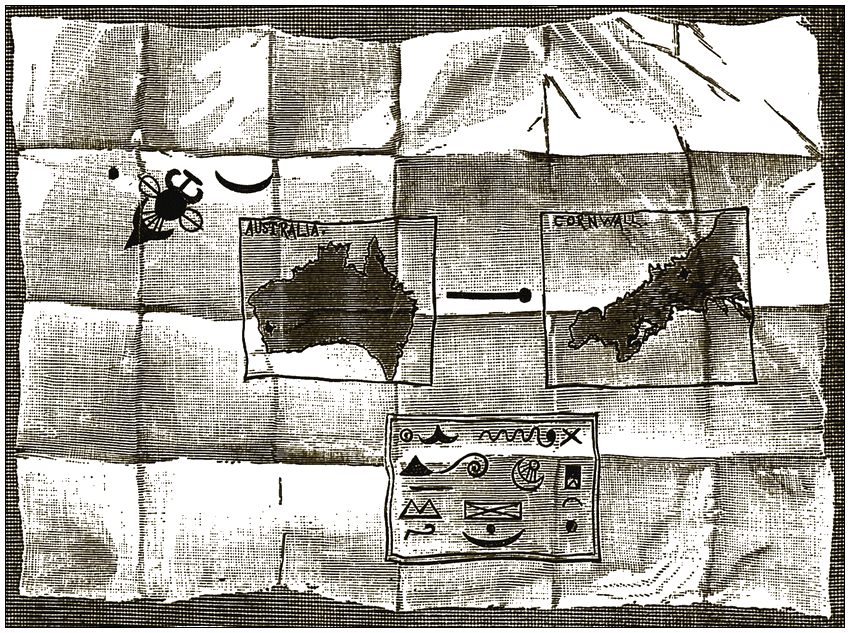
The Hieroglyphics.
I read and re-read, as best I could, these symbols. I held them up to the light, suffered the daylight to be transmitted through them, examined them even with my botanical microscope. The study was interesting, especially the last test. The tissue was exquisitely delicate. It might be the skin of some plant, if we may so call the vegetation of our sister-world. But there was nothing more to be learned about what I wanted to know of my strange friend.
At last the thought struck me of examining the envelope. I carefully tore it open, and there in a corner found, rolled into a very small space, such as could be put into a filbert-shell, a delicate little packet of a kind of tissue paper. I opened it with great care, not succeeding, however, in avoiding two or three rents in the tender, flimsy sheet. I unfolded it at last. It was written over with what looked like an imitation' of Aleriel's handwriting, but not very well done, as if each letter had been imitated unintelligently. However, in spite of this and of the rents, I could make out the following strange narrative, an evident continuation of the letters which I had received from Mount Aristarchus in our satellite.
OUR journey to our beloved home in Venus was a long and dreary one. As before, we got on one of the great meteoric systems for a part of the way, and then launched into space (a space now more illumined than before by the ceaseless blaze of the King of Day—the mighty Sun—far more brilliant in ether than he seems even at noon on Earth's tropics).
There he shone in that region of eternal day, blazing forth in the cloudless and pure ether into infinite space, with his burning rays of intense light. Nearer and nearer we went, brighter and brighter shone the King of Day.
At length the brilliant orb of our beautiful world grew larger than the sun himself. Then it spread over space as a mighty and gorgeous globe. The seas and the continents opened up in their soft or brilliant tints of blue and silver, the table-lands with dazzling brightness from their crystal surface reflected the intense sunlight.*
* The intense brilliancy of some spots of the surface of Venus are among the problems of planetary astronomy; are they caused by vast surfaces of crystals or metals?
Nearer and nearer we went. Soon the mountain-peaks, with their serrated ridges, were in sight, the ring mountains mottled the surface almost like that of the mountains of the moon, only the clouds and mists gave a certain earth-look to the scene.
Down, down to the alpine regions of the Antarctic continent we flew, down homeward.
We descended into the great ring-chain of the Simerian Mountains, in the centre of which is a lovely lake in which, upon a mountain raised over its fair surface, is the city of Simeria. Our approach was noticed immediately. The silver-covered towers and spires of Simeria glistened in the sunlight, and as we drew nearer, blazed forth in every hue of banners, in welcome to us on our coming. Then, over the placid lake there boomed the sound of explosives—not used by us, any more than on Mars (in the present enlightened state of that grand world), for destruction of life (as upon the Earth), but simply for engineering operations, for signals and rejoicings. So the explosions boomed from the silver towers and echoed over the lake to the great wall of mighty mountains, some fifteen, some twenty miles high, which formed the circle of Simeria.
At length we drew near one of the temple spires, and on its summit yoked our ether car. Then we descended into the great Garden of Simeria, where already the chiefs of the city were gathering to welcome us.
We descended, and once more touched the surface of our beloved world. The Simerians welcomed us with songs of greeting. The loud song of triumph burst from a thousand lips. We were conducted to the great temple of the city, where we offered our thanksgivings to God who had preserved us through our long journey.
Then we had a hearty and kindly welcome from our friends, and the chiefs of the city consulted what should be done in honour of our arrival.
It was arranged that we should narrate our adventures publicly to a general assembly not only of the Simerians, but of those of the neighbouring nations who chose to attend and were interested in the subject of our sister-worlds. The place where the assembly was to be held was a gorge of the Simerian Mountains, where the assemblies of that nation are usually held. A day was given for us to rest and prepare, and also for those from afar to come to hear us. The electric flash had already communicated to all our lands our arrival, and the aerial cars bore thousands from distant spots to welcome us home and hear the news we had to bring from distant worlds of space.
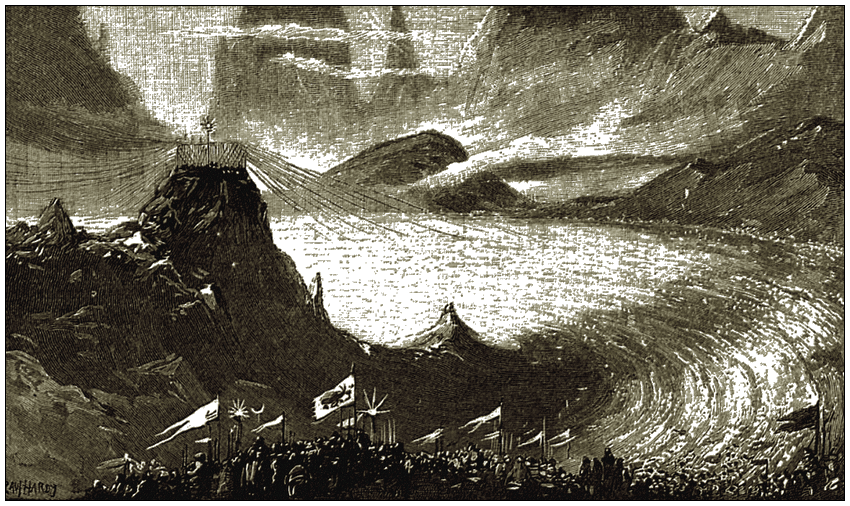
The Assembly.
Let me explain the object of these assembly-places, which in our world each nation has for itself. The idea of representative government is a transitional form of rule suited to the present condition of the Earth, but is not the most natural, and therefore not the most perfect The ancient ideal of antique Europe, of the Greek cities where the demos gathered in the agora, or in wilder nations where the whole tribe gathered on important occasions, is far truer, though unsuited to a transitional state like yours. No man can fairly represent another. Minorities are not really represented on earth. The ideal of perfect liberty is that of the antique world of democratic Greece, where each citizen represents himself, or at least his family. But as time went on, of course, on Earth, this became impracticable. Assemblies were too large, journeys were involved when means of locomotion were imperfect. So representation became desirable, and assemblies of citizens delegated their powers to chosen representatives, and oligarchies took the place of popular government, or popular government assumed the form of an oligarchy. But this is by no means necessary in highly-civilised communities. Where passions are controlled, quarrels are unlikely, or will be wisely suppressed. As rational beings obtain control over natural forces, locomotion becomes easy and rapid. The microphone and telephone convey sound. So really the need of representation ceases. Smaller business may be handed to chosen committees of specialists, but on important matters each citizen may personally give his vote. This is our mode of government; a simpler and more natural, and, therefore, a truer one than representation, but one only suited to small or else to highly-cultured societies.
So we went (accompanied in triumph by the princes of the nation) to the assembly-place of the Simerians. It was a magnificent ring-circle inserted in a gorge of the Simerian Mountains. About four millions of our compatriots were assembled, ranged along the slopes or on the rock-terraces (improved by art) of the amphitheatre of the mountains. The scene was impressive, with waving banners and symbols and the millions of brightly-attired listeners. We stood with the chiefs of Simeria on a rocky peak in the centre, whence telephones and microphones communicated all we had to say to the most distant limit of the vast amphitheatre.
At length the Prince of Simeria signed for silence to the assembly. Then he spoke thus:—
"Simerians and Friends,—Our comrades have returned from their long journey over planetary space. They have seen other worlds than ours, and come to unveil to us the wonders of the great Creator's works. Who can but wish to hear them tell what they have seen and where they have been? Let us ask them to narrate their story. First, what they saw of Earth, then of Mars, then Jupiter, then Saturn."
The multitude applauded with loud applause, and then were hushed.
Aleriel
The manuscript here ended. It was evidently but the first page.
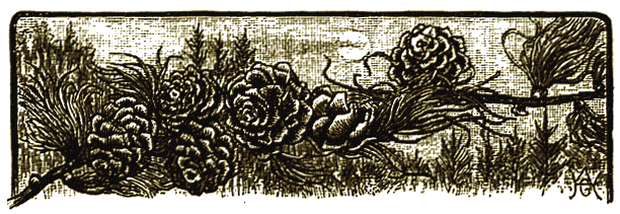

WEEK elapsed after the receipt of this strange letter. On the Saturday night after, I was sitting in my study writing. My study, I should say, was an attic, under the gable, which I had chosen for its quietude. As I was writing, suddenly I was startled by a tap at the window. I got up and looked out into the starlit landscape. There was nothing visible. "It must be fancy," I thought, so I sat down and began to write again. As I had just settled to my work again the tap came clearer than before. Again I arose and looked out. There was nothing visible, except that I thought I saw something dark floating in the air near the house, over the trees of the avenue. The thought struck me—"Had the mysterious messenger arrived? Was my reading of the hieroglyph correct?"
I resolved what to do in case my mysterious visitant should really be at hand. I opened the window and waited. Suddenly there passed into the room a form robed in a dark floating garment. I saw before me an intelligence like Aleriel—a being of another world—unearthly yet not supernatural.
I was moved deeply. For a moment I did not know what to say. He stood and looked at me, and then made a wave with his hand, which I conjectured was a salutation. Then he drew from his robe a scroll marked with the hieroglyph of Aleriel's name. It was his credential from another world. I looked at it and said, "Welcome to our world! You are the messenger from whom I received the letter?"
A soft, sweet, musical voice, sounding as if from far away, answered in English, "I am."
"Welcome, then, to earth! Welcome for our friend's sake and your own!"
He drew from his robe a packet. In it I found two letters, which I give here.
I NEED not relate our speeches—you know already the summary of our journeys. We gave a day to the description of each world we had visited. The first day we gave to the Earth, as the world nearest to us, when my comrades told their impressions of Earth and of mankind, as far as they could judge in their hasty visit. Then, on the second day, we spoke of the ruddy planet Mars. I detailed my journey through his divers seas in the electric ship, and they their travels around his ruddy globe, and the strange cities and wondrous spectacles of gorgeous grandeur they had seen; and, finally, we spoke of the moon, Phobos, where we had rested a while. On the third we spoke of Jupiter, that giant world, and of his many wonders. The fourth, and last day, we spoke of Saturn and his rings and satellites, and the many wondrous things we had beheld in that far-off ringed world.
When the great congress was ended, we proceeded to the City of the Stars, where we held a great consultation of many days with the learned, who wished to know all that we had seen in the other worlds of our solar system. Thence we went to other cities and addressed divers assemblies, and told them of what we had seen of God's wondrous creation in those far-off worlds which He had made and we had visited. Wonder and admiration was excited. The things we had brought with us from the distant planets were examined and discussed. The conclusion we all came to was that throughout the solar system there was an integral unity of design, and yet an infinite variety of manifestations of the wisdom and power of the Divine Creator of the Universe.
As now we found that we had the power of traversing the realms of space from world to world, and that science had so advanced our control over nature that the millions of miles of ether were no insuperable obstacle to our passing from world to world, the thirst for knowledge naturally grew by the tasting of the fresh wonders revealed to our race of the creatures of the Most High. A council was held, at the City of the Stars, of the greatest astronomers and engineers (or "nature-subduers," as we call them) of our world, and the question opened in what direction a fresh expedition should be taken into space. The answer was simple, for but one reply was obvious, and Akasion, the prince of the City of the Stars, briefly put it to us thus:—"As yet we have only gone outwards. The realms of Uranus and Neptune are so distant that it may be doubted whether our powers, with safety, can be used to attain such distant planets, at least until we have tried further experiments. But in the inner realm of the solar system we have as yet done nothing. The region of greatest wonders is at hand, not so far off as Mars and the Asteroids. There, then, let us send our next exploration—to our sister world, Mercury, and to the mighty king of day—the glorious Sun."
To this Arnorion, the great "nature-subduer," replied:—"The truth is, that there is a nobler prize to obtain by a journey inward than outward, but the difficulties are greater. In going outwards from the Sun we only went to realms of darkness and cold, and indeed in the worlds to which we sent we found that the cold was relieved by the heat of their internal fires; but in going inwards towards the Sun we go to a region of tremendous and terrible heat, and of light unutterably intense. New precautions will be needed. Greater power will be required also to contend against the mighty gravitation of the Sun, which is more than one million times larger than our world."
Both points were considered. We agreed that the journey to the Sun was most desirable, but was full of difficulties, such as would need new discoveries and new inventions. Still the "nature-subduers" agreed that they would try experiments to see if they could increase the anti-gravitating force sufficiently to contend with the power of the Sun, and also search for means to contend against his intense and tremendous heat.
These experiments took some time. Meanwhile we travelled to many more of the cities of our planet, and told the story of our journeys, and showed the strange things we had brought from Saturn, Jupiter, Mars, and Earth, and from your satellite, the Moon..
At length we were told that a "nature-subduer," Exalorion, had discovered a substance which could ward off the intensest heat. He himself, wrapped in this substance, had walked into a furnace heated to the highest degree; and even platinum, heated under electricity, had been wrapped around a robe of it and no effect whatever had been perceived. It was as utterly a non-conductor of heat as a thick sheet of iron was of light.
Okrastion also, another "nature-subduer," had found a means of immensely augmenting the anti-gravitating force on which our aerial cars depended.
On receiving this news I went again to the City of the Stars, and met my friend Ezariel there. We, together with the most eminent "nature-subduers" of our world, proceeded to construct a new car of much greater size and power than the former. We wrapped it within and without with the new non-conductor of heat; we fixed in it the mighty anti-gravitating machine, which inverted the force of gravitation, and repelled what otherwise would be a force of attraction.
It was shaped like a shuttle, with two sharp points, cased in the newly-discovered non-conducting medium. On the top rested the directing magnet, of enormous power, and the anti-gravitating force was rested in the body of the machine. Within was a small cabin of steel, filled with every needful appliance, in which we the five travellers made our journey. It was lighted by but two windows of oval shape, with crystals of various density, the thicker of which once fixed would only transmit the most intense light into the interior. We were prepared for intensest heat or bitterest cold, for darkness or for most brilliant light.
Aleriel
AT length we launched again into space in the mighty heat-protected car which we had constructed, but now not towards the region of darkness, but to the king of day, and the realms of eternal light that surround the mighty Sun. Our first stage was to be, as we had planned, to our fellow-planet, the bright world of Mercury. Hither we sped with vast rapidity, as soon as we got clear by our anti-gravitating force of Venus. On, on we flew. Mercury appeared first as a bright globe near the Sun, then as he rotated in his orb towards the point to which we were going, as a moon growing larger and larger in space, and at the same time narrowing his luminous disc. But he was not an airless moon like yours. He was intensely bright, and around him were the double rings of his double atmosphere.*
* In the transit of Mercury of 1878 two rings were observed enclosing the planet—and outer one of violet, and inner one of a very bright around the dark orb. The spectroscope leads us to think that there is a watery envelope around Mercury, but the subject is obscure.
"All the inner worlds," said Ezariel, "seem to have two envelopes on their surface. In Earth and Mars there is an outer atmosphere of air covering the whole surface, with an inner and partial one of water filling the ocean. Our world has its atmosphere and its oceans. In the Moon we saw a world the surface of which was bare to the ether. Here we have a world with a double envelope of the outer violet atmosphere, and of the inner bright one."
Meanwhile we were advancing towards this globe, on whose waving crescent of light the Sun shone. In the illumined part were to be seen huge mountains, almost as vast as ours, of ten miles or more in height, ranged in rings like the mountains of the Moon. On the dark part whole provinces, as large as several English counties, were illumined by the electric lights of the vast cities of the Mercurians.
As we approached the half-illumined globe we entered (about 500 miles from his surface) his outer violet atmosphere. Soon we perceived that not merely the surface of the planet, but the vast outer atmosphere itself, was peopled, and that the Mercurians were not restrained to the surface of their little world, not so much larger than your Moon, but dwell in the atmospheric shell? around him, and swarmed in the vast outer space, so that, though the solid planet appears so small, the true planet is not confined to it, but includes the atmospheres where we perceived the cars of the Mercurians floating in space, like gnats in a summer evening.
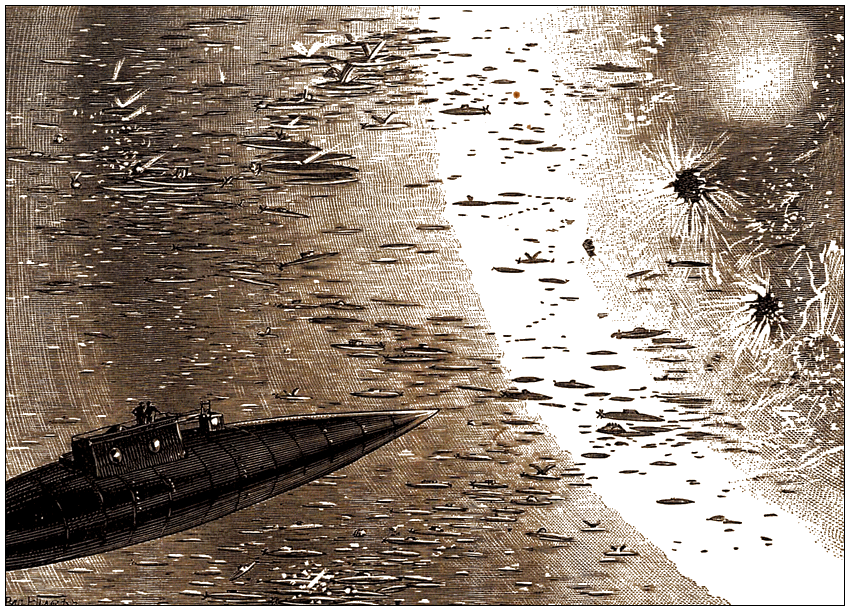
We perceived the cars of the Mercurians floating in space.
"Surely," said Ezariel to me, "this little planet has slight gravitating force, and so the Mercurians can with little effort float away in space as far as their atmosphere extends, even if they are not able to launch forth into the regions of space around their planet."
On, on we flew, carried forward by the gravitation of the planet which, weak though it relatively was, now, when the anti-gravitating force was removed, was potent enough. We swept past many a floating islet in space of the Mercurians (for they seem to a great degree to live in their atmosphere far from the planet) on into the lower atmosphere of their world. We saw a lofty mountain range, and here on a peak we rested, and from here I write you this letter. At length I have seen and rested on the surface of each of the planets of our solar system, inside the distant realms of far-off Uranus. My object is attained.
Aleriel
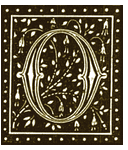
UR stay upon Mercury was very short. The Mercurians were intelligences apparently superior to ourselves in command over the forces of nature. We soon passed from their wonderful and beautiful little world. Eraziel was very disinclined to remain on Mercury, and he and Alnorion favoured strongly our carrying out our chief project, and journeying to the realms of inconceivable wonders—i.e., the glorious regions of the Sun. I could not oppose this view. The object of our journey was mainly to contemplate the wonders of the Sun. So, having photographed what we could see of Mercury, and collected some wonderful things, which i may in a future letter describe, we resolved to loosen the anti-gravitating powers and advance towards the central luminary of our system.
On, on we flew from the mountains of Mercury towards the great king of the Solar System, the mighty Sun. Brighter and brighter grew the scene. Mercury slowly faded into the darkness; his lofty chains of ring mountains, whose brilliant peaks were illuminated by the solar rays and flashed them back, his double atmospheres—envelopes around his globe of white and' violet—faded in the distance; less and less they seemed, till at length he was nothing more than a large, glittering sphere in the outer darkness. But we were going on and on into the realms of eternal light.
Our rate under the powerful gravitation of the Sun, as soon as we got clear of Mercury, was about a hundred miles a second, but even that was scarcely perceptible for a long time, for nothing opposed our onward movement towards the huge solar orb through ether, until (when we had already got about a million miles from Mercury, and he seemed about the size of your Moon in space) all of a sudden our car met a terrific bombardment of meteors belonging to a system, which we had struck at right angles, in its rotation around the Sun. Had it been made of any earthly material, the car would have been shattered to atoms; but as we had made it the meteors merely thundered on its sides, smashing their projecting parts, which gave sparks with the sudden friction, or else glided off on its smooth surface.
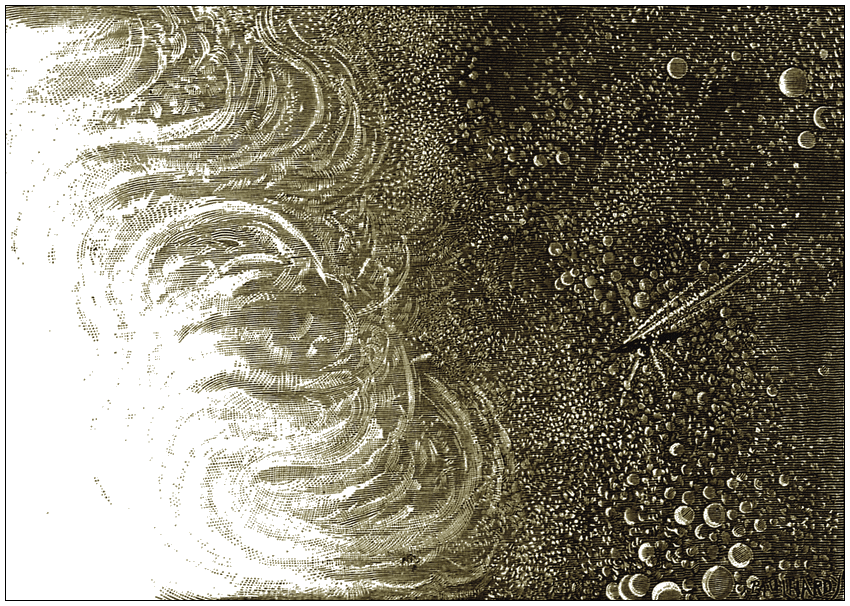
Our car met a terrific bombardment of meteors.
On, still on, we darted. As we proceeded, the meteor hosts, like clouds in space—or, when nearer, like swarms of gnats glittering in the sunlight—grew more numerous and, as it were, lessened the sense of vacuity in the immensity around us.
Brighter and brighter grew the solar blaze as we went on. Behind us in the outer darkness of space were the distant planets, each appearing in its true position, save Mars, which was at this time lost to sight in his rotation among the solar rays. We felt as we looked back we were near the centre of the Solar System, and each world, Mercury, Venus, Earth, Jupiter, Saturn, Uranus, Neptune, appeared in its true position in the black, outer darkness of space. We looked at them—with our telescopes veiled from the solar blaze—with interest, and also at the distant, sparkling points of the stars. But the observation grew constantly more and more difficult, for we were launching into the region of Eternal Day; of light so intense that soon we had to darken the front window of our car with the thick, darkening crystal, which impeded the transmission of the intense light.
On we dashed: brighter and brighter, hotter and hotter, till we were forced to use the recently discovered non-conductor of heat, which had been devised to check the furious blaze of the mighty Sun.
His orb grew huge in the heavens—a vast field of light. But it was no tranquil orb like the planets. Already the colossal forces at work on his surface were manifest by their effects. Vast changes appeared all of a sudden and then disappeared in the seething masses of light, and of burning metallic vapours. He was no inert orb of matter, but almost (to liken the infinitely little to the infinitely great) as a living body in full activity of waking life. All the forces of nature seemed in gigantic operation on his vast surface. Light, heat terribly intense, electricity most potent, dynamic force inconceivably rapid and potent; all were at work on a vast scale. Spots as large as the much-vaunted Russian Empire, or as the world-encircling colonies of Britain, opened all of a sudden into the solar depths—like huge chasms millions of miles deep, and then closed over, sometimes with bridges, sometimes with peninsulas of light, which rapidly expanding obliterated them, and they were lost for ever in that surging blaze.
Along his disc now and then appeared the gigantic "rose clouds" in thousands of grotesque or beautiful forms, like enormous fountains of ruddy fire. They were something like the lava eruptions of volcanoes, only ten thousand times augmented: arches of light, in form, sometimes as arcades of Gothic cathedrals, sometimes like stalactites of caverns, but all of blazing vapour intensely heated and brilliantly illuminated. No words of any earthly language can depict that stupendous scene.
Behind and around the vast blazing globe now covering the heavens in an aurora of light was the glorious Corona. It arose millions and tens of millions of miles into space, one of the most glorious and lovely of the works of the great Creator.
Forward we still flew towards the blazing orb, but the nearer we went the more the circling lines of meteors met us like swarms of gnats (only each meteor was itself a tiny world). Systems after systems we passed—above, beneath, on either side. Each meteor shone brilliantly in the solar blaze on the side turned towards the Sun.
We saw a huge spot opened before us in which the whole earth might have been swallowed. We directed our course towards it, hoping to be able to approach nearer in this way than by approaching the photosphere. Already the clouds of incandescent metals which seem to give on earth a white light were severed. Red, green, blue, yellow, like a gorgeous display of fireworks they appeared, only all the firework displays that earth has ever known could never, all put together, approach to them. Like miles of sapphires, rubies, emeralds, did those gorgeous clouds of metallic mist blaze in every direction.
"Can it be," said Eraziel, "that this huge orb in which all the forces of nature are so stupendous is without life—after all a mere dead mass of matter moved by force? Is it only meant to warm the peopled planets and to enable life to exist, but in itself without life—a mere play of lower forces in their most stupendous development? We have found life so far in the lesser orbs, and it almost seems as if to support life was their chief object—in Earth, upon our world, in Mercury, in Mars, in the greater planets. Yet all these together are but a province of the Sun. Is this huge orb all death and desolation, and the abode through endless ages of lower forces playing on dead matter?"
"I cannot tell," I replied. "How could any living thing, any living being such as we have known, exist for a moment in that huge world of fire? The integuments of the body would be burnt up."
"Nay," said Alnorion, "that would be true of bodies such as we have known; but might not spirits, even here, intelligences of a higher order, be enrobed in ethereal bodies such as we cannot understand, and revel in the development of the lower forces at their will—electricity, light, heat, magnetism, dynamic force?"
"But," I pleaded, "they would be melted in this heat. Even metals are in a gaseous condition. All seems resolved by the intense heat. If it were not for the non-conductors around us which are so marvellously impervious to the heat, we ourselves should be melted into vapour."
We discussed the point for some time as we were looking on the superb and gorgeous spectacle of the fiery clouds of photosphere. Our speculation had an abrupt conclusion. Suddenly, while we were talking, what seemed like a huge cloud of metallic vapour floated towards us. From its surface darted electric flashes. It rapidly approached our car, robed in intense light. On its surface suddenly blazed in fiery letters these words in the symbols of the celestial alphabet:—
"Back, children of the world of Venus, back to your homes. It is not permitted to you to approach nearer the realms of light."
In a moment we felt the force of gravitation reversed; the car was turned in its course, and launched backwards into the infinite space with inconceivable velocity.
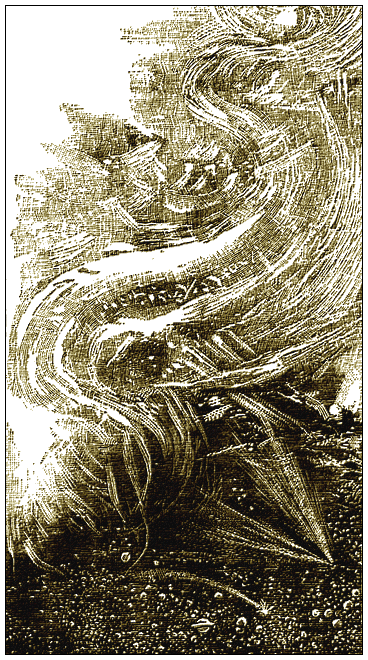
The car was turned in its course, and launched backwards
into the infinite space with inconceivable velocity.
A mighty intelligence more potent than ourselves—as the mighty Sun was vaster than our lovely world—willed that we should go back. We submitted. We had seen enough; and it seemed the Divine will that we should behold no more.
Aleriel
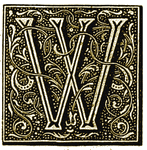
E dashed from the mighty Sun back into space. The metallic mists of copper, of iron, of calcium, of magnesium, of barium, of cobalt, of nickel, of sodium, "of manganese, which had blazed forth in every hue of prismatic colour—an inconceivable pyrotechnic display—slowly amalgamated into the one white glare. From a gorgeous hurly-burly of intensely blazing clouds of many colours the Sun slowly became a brilliant white luminary in the heavens, gradually diminishing in size from extending all over one side of the view to first a half, then a quarter, and at length a tenth of the expanse of the heavens.
Back we went into the outer darkness of space. The huge spots appeared again, not as vast regions—territories, so to speak, of an open expanse, traversed in many directions with brilliant clouds—not of water as the Earth's cloudland, but of metallic mist—of iron, of magnesium, of sodium, and numbers of other metals—through which the inner and darker orb of the huge world might be seen. The "rice-grains" of the Sun no more appeared as little worlds of dazzling light, but were merged together on his mottled surface. The rose-clouds even began to melt undistinguished amid the general blaze of light of the huge orb of day.
Back our aerial car dashed through space away from that vast region of light and force and motion which we had dared to approach. We passed through the realm of the corona, on to where what you call the "zodiacal light"—the distant solar atmosphere-extended itself. On we went through regions of meteors—systems on systems—sometimes rushing to the right, sometimes to the left of us, sometimes above, sometimes beneath, sometimes cannonading on our car with their bombardments and crushing in flames against its surface.
We passed the orbit of Mercury, but he seemed now but as a little star in the dark heavens, for the planet had now moved in his rotation far from our line of travel, and we approached our own world of Venus.
The prow of our car was turned towards the great plateau of the North Pole of Venus, where the mountain ranges arise from the Arctic Ocean to colossal heights, and where the snows can be seen even by Earthly telescopes. There, in those Polar regions, at heights of ten to twenty miles, the mountains, compared to which Mount Everest and Mont Blanc would be but hills, lift their tall peaks crowned with eternal snows, which even the summer heats of our sphere (so much hotter than yours because so much nearer to the Sun) cannot melt.
The glorious blaze of these huge glacial mountains reflecting the Sun's light is inconceivably grand. Even coming from the wonderful and awful realms of eternal light, it seemed most beautiful. It is partly to these glacial regions of the polar table-lands, as well as to the white clouds that circle our world, that the brightness of Venus, many times greater than that of the Moon, is due.
WE landed at the City of the North Pole, which is built in a deep valley encircled by colossal mountains from ten to eighteen miles high, and sheltering it from the bitter Arctic blasts. As the Sun does not shine upon it for much of the year (on account partly of the mountain shadows, partly of its being in the Arctic regions), the heat and light are mainly artificial. It happened now, however, to be the Northern summer, and myriads of our countrymen had come from divers lands to see the wonders and beauties of the Arctic regions, and to stay awhile at the City of the North Pole, just as a few adventurous tourists on Earth annually go to see the "Land of the Midnight Sun"—i.e., Norway. With us it is thought pleasant and desirable for every one occasionally to spend a summer in the Arctic regions, and to stay, a few days at least, at the Pole itself. Perhaps the time may come when this will be the case on Earth, but it seems far distant, for—firstly, the sun is farther from your world than from ours of Venus; next, from the tilting of the planet the summer is warmer; and, thirdly, vast progress in command over nature will be required before men can even reach the Poles. I expect it can only be done by perfecting the art of flight, or aeronautics, for the only convenient way of reaching the North or South Pole of either Venus or Earth is by flight.
We descended amid the great ring chain of mountains, down which, in the summer thaw, the cascades were pouring from the glaciers, and we poised our car over the glittering domes and towers of the great City of the North Pole. Then we slowly descended, amid the plaudits of the crowds who welcomed us home.
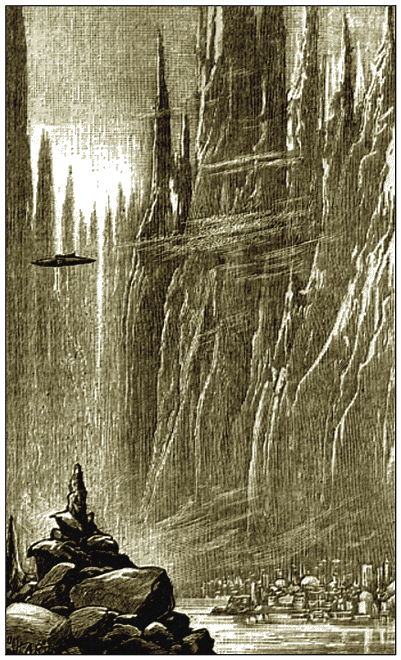
We poised our car over the glittering domes
and towers of the great City of the North Pole.
As we alighted we were welcomed by the thousands of visitors at the Polar city. Joyous was our welcome, and deep our gratitude to Divine Providence, as we descended from the car which had borne us so well through the dangers of our awful, yet glorious, solar journey. We now noticed how it was encrusted with many metals which had fallen on it in the form of metallic rain as we had got near the Sun-spot, and now were crystallised around it in a strange form of metallic efflorescence. Tiny cubes of copper, iron, magnesium, cobalt, were there. The record of our near approach to the Sun was on the car itself.
A congress was summoned, the third day after our arrival, in the assembly-place near the city—a vast amphitheatre enclosed by mountains, and close to a beautiful cascade which in winter was frozen, but now rushed down the mountain crags. The scene in the summer sun was very beautiful as the congress assembled to receive us. Tens of thousands were ranged on the terraces and ledges of the rocks to see us, and to hear what we could relate of our journey to the Sun.
I need not narrate the account of the congress, which was something like the former one, which I have described before. We told all we had seen, and showed the specimens we had collected from Mercury and the solar regions. Then questions were asked, and for several days the congress lasted. At length Azarian, one of the Princes of the City of the Stars, suggested that the work of communicating between world and world of our system, and of studying our sister-worlds by actually visiting them, should be continued, and another journey should be planned. Ezariel was the chief speaker of our party. He assented to the view that now, since we had as mere voyagers visited the worlds around us, and even seen the mighty centre of our system, a more thorough exploration of one or two worlds would be desirable. The two that especially presented themselves to his mind for further inquiry were Mars and the Earth. But he urged that a larger car and a larger party of specialists, who would make a thorough inquiry, were desirable. The difficulty was urged by Axorian, the Prince of the City of the North Pole, that there would be a danger of our being observed and detected both in Mars and on Earth if we went in so large a party. But Ezariel, who had visited, as I told you, both worlds before, parried this serious difficulty by proposing that our party should confine itself to going around the two planets and photographing carefully all the scenery of each, and to land in some remote part of Mars, and on the Earth to rest in the wilds of Central Australia and perhaps in Equatorial Africa, where men would not be likely to find us out, and where we could examine the animal and vegetable life of the Earth, and many other matters of interest, without any fear or risk of interruption or discovery.
This view was accepted by the congress. We each proceeded to our homes, and the great nature-subduer, Ornalion, was entrusted with the construction of a large car for twenty specialists to go through space to Mars and the Earth, to examine in each world the wondrous works of the great Creator. It was provided with powerful magnets and anti-gravitating machinery, and was of the strongest materials. In it a large quantity of specimens, and also all requisite apparatus, could be stored.
I RESOLVED to join the expedition, and in less than a quarter of one of our years I was once more flying through infinite space to the regions of the ruddy world of Mars.
I need not describe our journey thither. The spot we chose to rest on was Hall's Snow Island, as an unfrequented and desolate region, yet not far from the great centres of Martian life. Here we landed by night, and remained two days on one of its lofty peaks, whence we could see part of Copernicus Land, and the Schiaparelli Lake, beyond which Kepler Land shone in rich crimson glory on the horizon.
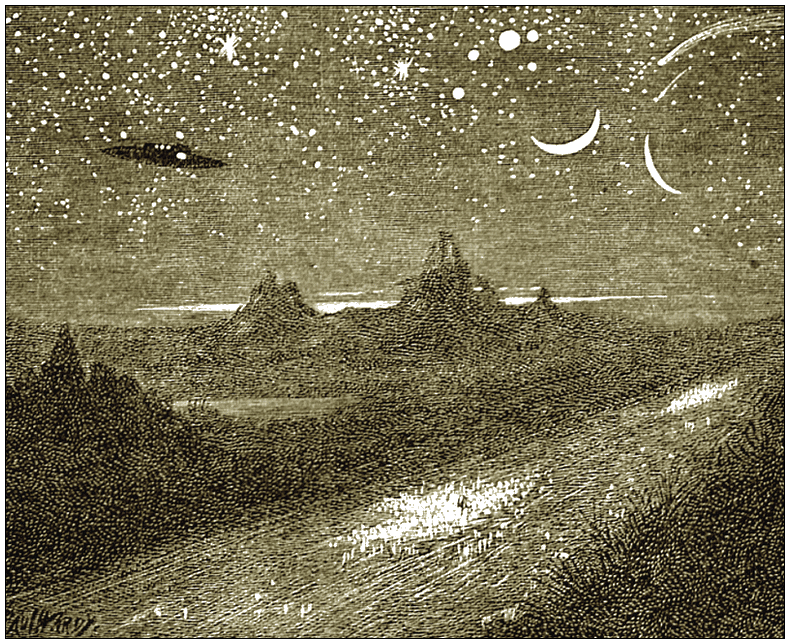
Mars by night.
The sun rose on the ruddy land, shining over the crimson forests, varied by the green seas, which in richest hues adorned a landscape glorious in its gorgeous colourings. On one side the De la Rue Ocean expanded its green surface to the horizon, now rippled by ridges of white foam, now tranquil like a sheet of green glass. Kepler Land on the other side and Copernicus Land spread their crimson expanse to the faint green horizon of the Terby Sea. Along the shore in green lines, here and there, were the great straight canals of Mars, that diffused the waters over the land, and which here stretched to both the Schiaparelli and the Bessel Lakes.
It was arranged that after two days' stay on the snowy peak, which was well nigh inaccessible to the Martians, the rest of the party should start on an aerial expedition around Mars, and, poised in mid-air at great heights above his atmosphere, should photograph the divers scenes of the planet, and so record all that was to be observed for the philosophers and museums of our world, and that Ulnorion should accompany me on or near the surface of the planet, and that we should be disguised, as nearly as we could, in the Martian costume and aspect, which, in truth, was very difficult, on account of our smaller size.
According to this plan we flew across to the Lagrange peninsula, and thence by the shores of Pratt Bay passed into the interior of Secchi Continent. Here the great system of canals of vast length and width struck our attention. They looked artificial, yet in width were like sounds or straits, but stretched for hundreds of miles, as clear from any undulation or bend as if they had been drawn with a ruler. Their green lines marked the red land, like lines ruled on a music book, varied land with water. On their surfaces were floating islands of the Martians, crowded with houses and factories and towers (like moving cities). On their shores were also vast edifices, where we could see the great machines of the Martians working and moving. Like a huge spider's web they spread over the crimson expanse of land.
From here we resolved to go to where my former Martian guide lived, that by his aid we might both obtain more information about this gorgeous world, and also that Ulnorion might, by his separate report, be able to add to or correct what I had learnt about Mars.
I found without difficulty the home of my former Martian friend and instructor. There it was—the domed house glittering with metal ornaments beneath the ruddy foliage of the forest. I led Ulnorion to the door, and then, noticing one of the windows open, I signed to him to fly in after me. My old friend was there, and was much alarmed at first at the unexpected apparition of two beings from another world, for I had cast off my disguise, so that he might know me. But then recovering himself, he recognised me as his former friend and guest.*
* See Aleriel; or, a Voyage to Other Worlds, pp. 115, 153
"I have returned again to your bright and gorgeous world, as I longed to know more about it. May I have your help to see it again, unknown and unobserved?"
"Welcome!" was the reply. "I often have thought of you and of your bright world, and all you told me."
And then he welcomed us with the Martian rites of greeting, and lighted the sacred fire upon the pillar, and offered us warm food. This we gladly accepted. Ulnorion, I noticed, however, was timid and ill at ease. There is a natural shrinking of all creatures from beings of another world, and so I found Ulnorion and our Martian host shrank from each other instinctively.
But as time went on this lessened. I asked our Martian friend about the events of my past visit, and showed him how I remembered what he had told me. Then I suggested to Ulnorion that he might ask any questions he wished about the ruddy world in which we were, and I would interpret his queries. As I expected, the first question he asked was about the wonderful canals we had recently seen.
"Will you explain to me," said Ulnorion, through me as his interpreter, "those huge canals that, straight as a line, mark several of your continents? They do not seem natural, for nowhere by natural laws are such straight lines formed; nature is ever devious, and tends to undulations, but these look like vast engineering works. Are they such, or do the laws of nature work in this world differently to the way they work in other planets?"
"They are mainly artificial works," said our Martian friend, "though utilising our rivers and lakes. Our command over natural forces has in recent times become very great. So we resolved, for our own convenience, to turn the rivers and lakes into great canals or sounds. It was for the advantage of the country that water and land should be evenly distributed. By machinery and the use of natural forces we were able to correct nature to our own purposes. These straight canals are of great value. Water and land combined produce food, and on the water we can travel with rapidity and comfort from one part of our world to the other. Since we have had no wars we have been able to devote our force to the arts of peace."
"What are those huge floating islands I saw on the canals?" asked Ulnorion.
"They are the floating cities. Instead of staying in one place, it is more convenient to move about. Thus we can live in a perpetual summer, and not merely leave our homes, but take our houses and our gardens with us over the waters from ocean to ocean, from land to land, and draw food both from land and water."
"There is," I said, "on Earth a far-off approach to this moving population in the floating hotels or great steamers of the Mississippi, and, on a very small scale, in the floating population of the little Chinese canals."
"There is another point," said our Martian instructor; "on Earth and in your world of Venus there is no scarcity of water. Our population is great, and our supply of water is not enough. The rains are insufficient. If we depended on nature alone, the inner parts of many of our continents would be desert and want moisture. Now we open them up by these canals, and diffuse water everywhere on the land as is most convenient to us and likely to develop the production of the soil. So land and water brought together produce food. Left to themselves we should have land in one part and sea in the other, and our planet could not then support so much life as it does now."*
* Some very interesting discoveries have recently been made by M. Perrotin about the "canals of Mars," and a map of these extraordinary green straight lines on the red surface of the planet has been constructed by him. They look on it very like the aspect of a railway system on a colossal scale.
The fact was, as he said, the Martians lived mostly on what (to use Earthly language to explain unearthly organisms) you would call aquatic plants. The ruddy vegetation of the land (similar in some points to the food-bearing plants of Earth) is insufficient for the teeming population. But, fortunately, the algae or sea-plants of Mars are far more nourishing and agreeable than those of Earth. They form an exhaustless store of food, with the huge heaps of edible molluscs (somewhat like your oysters) which fill the Martian seas. But the great ocean-depths are less useful for these aquatic plants and animals than the shallow waters of the huge Martian canals. In ancient times, indeed, the Martians looked to the ocean for supplies of food; but as population increased and also their power of controlling nature, they found it better to construct long shallow seas (which could be drained as required) in which vast oceanic farms could be formed for supplying food. Even on Earth the supply of food by the ocean would be inexhaustible; and perhaps in ages to come, when every land is over-populated, man may be forced as the Martians to establish fish-farms in shallow artificial seas to supplement the food supply.
"There is much wisdom in what you say," I replied. "If Northern Africa or Australia had some such system of canals as this, they would produce much more and suffer less from drought and desert."
We issued forth from the house, and mounting on a hill close by, watched the Sun slowly descend over the crimson plain and the vast green network of canals which stretched in all directions at our feet. Our Martian friend named the canals to us and told us where they led.
Thus we conversed until the shadows of evening gathered in; and then Ulnorion and I waited for awhile to watch the dying rays of the Sun shine on the ruddy forest-glades, over which soon shone in the still sky the two bright evening stars—i.e., Earth with her little satellite the Moon, and Venus our bright home; and besides these, the two moons of Mars, Deimos and Phobos. And then, as the constellations appeared, we returned to the domed house, and under its hospitable shelter rested for the night.
Aleriel
* See "Our Second Voyage to Mars"— Cassell's Magazine, 1889. Page 166.

ORNING came. The bright sun shone into the metal-adorned dwelling: the same glorious sun as we had known at home, and as you behold on Earth, to which indeed all Earth life—plants, animals, men—owes vitality and heat. It shone on the ornate and bright metal pavement of copper and tin; it shone on the metal walls, and was reflected upon us.
We arose, and left the dwelling to look on the forest around. There were the crimson trees in rich splendour, through whose glinting foliage the ruddy rays of the sunlight pierced. There were the rocks rising over the tall metal dome of the house; there in an opening appeared the distant green sea and the summit of far-off snowy mountains. Red, white, and green—all were commingled in that glowing spectacle.
We returned to the house. Our kind but gigantic host welcomed us on our return, and said to me:—
"If you wish to see the canals, the electric boat is at your service. You may take a long voyage in it, if you like."
"We should indeed," I said. "I wish my companion to see the great canals of your wonderful world. But how shall we manage about disguise?"
"I have some garments of our children, which may suit you as disguises if no one comes near our boat; and if they do, perchance they may not observe that you are of an order of beings different from ourselves."
So he lifted the portcullis, which served for an inner door, and shortly came forth with our kind hostess, Alehiro, who brought with her the robes of metal scales and glass fibre which her children used. They were beautiful glittering robes, though very different from ours. However, we easily wrapped ourselves in them, and, covering our heads with metallic helms, looked like two Martian children.
A little vessel was floating on the green canal waters, chained to the shore. Our host drew it towards him and entered it. He beckoned to us to do the same. We stepped on board, and lay on the couch which was in the bow. The boat was shaped like a torpedo boat, for throughout the universe the laws of mathematics and mechanics must be the same, and thus the principle of the least possible resistance must be the same, even as far as the attendant worlds of Sirius or Alcyone. Our Martian host touched a brass knob in the bow, and rapidly and silently the boat was propelled upon the green waters.
Forward we swept along the straight reach, with ruddy foliage on either side rising in crimson glories, gorgeous in the sun's light. Here and there amid the red leaves were the glittering metal domes of dwellings. On the shore strange forms of living beings, of shapes unknown to Earth or Venus, might be seen, while others were in the water or flying in the air above. It is true that the types of life are the same throughout the solar system, and thus you, on Earth, may have all the various forms in which it is developed. But still, as there is underlying unity, there is also an infinite diversity in creation.
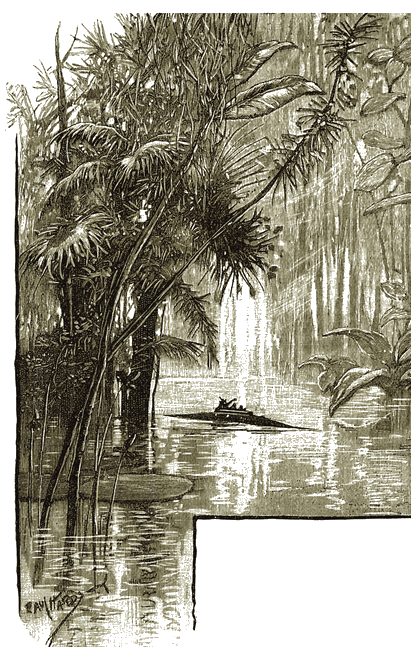
Forward we swept.
Thus, although the forms of Earth's animal and vegetable life were there, they were all distinct from those you have on Earth. No animal was the same as that you have here, nor even very like it, although in many forms of life the type of some of the animals which you see on Earth, and such as we have with us, could be traced. Then, again, development? of life, such as are very rare on Earth, were here most common; and those which on Earth are small were here gigantic; while, on the other hand, animals which on earth are very common—e.g., the horse, the bull, the sheep, the sparrow, the finch—could not be seen at all, nor any creature like them. Thus the scene before me was one of life and motion, for Mars is made to support life as much as the Earth; but still each and every development of life was distinct from what men see, and the whole scene was like the monstrous imagination of a disordered dream. Still each creature was formed in perfect harmony with its position in creation, and many were very beautiful in glowing colours and in graceful forms.
You need not wonder that in another world the forms of life are different from those on Earth, for is not (even on Earth) marine life distinct from terrestrial, though belonging to the same planet? and even on the land in past ages forms have prevailed and been highly developed, which now are rare and small: e.g., the trilobites of the ancient seas, the silures, the plants of the carboniferous era, the iguanodons, and ichthyosauri, and plesiosauri of secondary ages. These are but Earthly creatures, though of Earth's infancy, and such as man might suppose fitted for another planet. Nay, more, even on Earth at this time are not the flora and fauna of Australia different from those of Europe? How different must be the life on another planet, even though one so like Earth as is Mars!
On we dashed over the green waters embosomed by the crimson forests and fields, till we came to a wide reach, which stretched for eight miles wide, and extended for a thousand miles and more (as our Conductor told us) from sea to sea. Its shores were perfectly straight, and it looked like a vast river—like the Mississippi or Amazon on Earth—indeed, no river on Earth in continuous width approaches its size. But it was all the result of the industry and command over nature of the Martians. Rivers had been straightened, lowlands had been submerged, hills had been blown up, whole territories had been altered and changed in aspect, to make that huge canal, or rather submerged land, through which the fertilising waters flowed, to bring moisture and life to the immense submarine fields of vegetation which grew there. Compared to this, the Suez Canal or the greatest ship canals of Earth were but as the little gutters dug by a child for an afternoon's amusement.
Moving on the vast canal, or rather artificial sound, about a mile from us, there was a floating city, resting upon huge pontoons, nearly a mile long, and about a quarter of a mile wide. Each end of the city was narrowed to a point, so its form was not unlike that of a river steamer, only its size as compared with the greatest ocean liners, like the City of Rome or the Oceana, was as these are to the little ships of your forefathers. The pontoons themselves were enormous vessels, larger than any ship you have on earth. They were bound together in rows, and a pointed one was in the head at each side, acting as a cut-water.
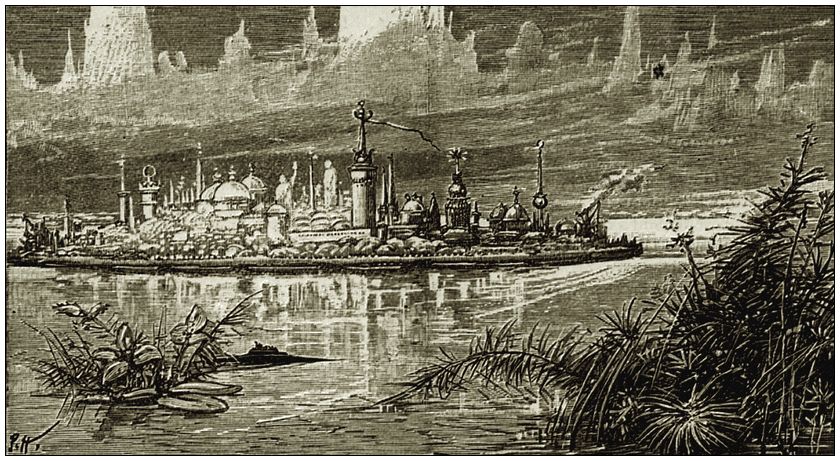
The Floating City.
The city was formed like the usual towns of the Martians, with domed houses of bright metal, which glittered in the sun, and in the midst what looked like huge statues, but which, as I imagined, were also the residences or public buildings of the citizens. At each end was a great engine, where it was manifest force was being generated (probably steam, for smoke was issuing from one of them).
"Why do not they build their city on one huge ship? I see it rests on pontoons."
"For fear of accidents. Should a vast ship, capable of supporting such a city as that, meet with an accident—get into shallow water or strike a rock—the loss and risk would be terrible. But now that city has twenty-two pontoons on which to rest. Should any accident befall one of these, it can be removed and replaced by another, which may be obtained in any of the cities on the bank. The city is then uninjured."
"Are those great statues or houses that I see?"
"That lofty statue of a Martian lady is only the representation of a heroine who lived in this floating city of Golonor five hundred years ago. It was in the bad old days, when we had wars in our land. A king of one of the countries the city passed through stopped it, and seized it for ransom, and wanted to enslave the people. They were yielding themselves to slavery, but she roused them to arms, and set herself at their head. They gained the victory, but she was killed. So in her memory they made a statue of her, and put it in the city; not a solid statue, but a hollow one, so that some of her descendants might live in it. They live there to this day."
"In the old war times you speak of, these floating cities must have been exposed to frequent dangers."
"Very true, they were; and this was one of the arguments that were urged against war in the final Peace Congress. They said, even supposing the inhabitants of the land could dwell in peace in their homesteads, those who lived on the seas and rivers were cosmopolites, and ought to be able to go everywhere. Then, again, you see how much of our food is derived from the waters. It was most unjust for those who lived on the shores to claim all the food supplies near them. So we declared all the waters free, and all in them, and thus we made the way to making the land free, and all nations in amity."
"On Earth," I said, "things may tend in this direction. By the law of the nations of Earth the high seas are the property of all, and international law alone rules there. If seas were a chief source of human food, and if, as I see here, a large portion of mankind—men, women, and children—lived upon the sea, we should find something of this state of things. But however have you obtained force to make these vast canals? Have all nations combined?"
"Yes, we have now immense control of nature's forces, as you know. By the action of nature's powers we can mould her to our will. These canals are the works of centuries, wrought by a whole world at peace. The force we once wasted in wars against each other we now use in overcoming nature's obstacles: in sinking land and flooding it with water when we need it; in piercing mountains and moulding them to our purposes; in widening rivers and making them straight. We can do almost what we will with nature, by the kind and loving permission of our Divine Creator, for we are a world at peace and combined, and a thousand millions of Martians with machinery and science at their disposal can, in a few centuries, do almost anything to mould the surface of our planet to our utility."
"But tell me," said my companion, "what is that other huge statue two hundred feet high that I see right in the very centre of the floating city?"
"That is merely the Town Hall, where the citizens assemble for public business. The figure represents the city of Golonor. It is the symbol they know it by from the shore, as it floats from sea to sea."
We soon got ahead of the floating city of Golonor when another appeared going the opposite way. It was still larger, about a mile and a half long, and had seven immense towers rising from its metal domes.
"How can the inhabitants of these cities get food?" I asked.
"Do you not remember?" asked my guide, "that most of our food is floating on the waters, not attached to the land? Those vast aquatic fields offer an almost endless stock of food."
He pointed to the great fields of what were more like huge algae than anything on Earth, the vast marine plants that floated on the canals, some as big as forest trees. Many of the singular changes and variations in tint of Martian seas which even Earth's astronomers have noticed are due to the tinting of the great waters by these vast fields of marine vegetation. As on Earth men and cattle are mainly supported by the grasses and corn, so in Mars it is the aquatic plants in the canals and seas that are the main supports of life. Hence the need for the vast system of irrigation. On Earth the rice plant is the chief marsh plant that provides man with food. Here vast fields and aquatic forests laden with tons of food, transforming the oxygen and carbon of atmosphere and water into food, waved hither and thither in the watery currents, and varied with many tints the green waters.
On we floated in the centre of the stream amidst these submarine forests, passing now in one direction, now in another, the floating cities which slowly and majestically moved through the vast canals.
We had not proceeded above fifty miles before we came to another huge sound—or rather canal, stretching one hundred miles to the north, cutting our canal at right angles. On its waters were two floating cities, and vast forests of vegetation waving in the currents, with their great leaves floating like water-lilies.
Forward we went, and then, some twenty miles on, another canal, with a city built on the shore at the confluence, opened to view. So we went on passing cities and forests, both on sea and land, on this huge masterpiece of the marvellous skill and power of the Martians—an achievement as far superior to any man has yet achieved in this age of steam and iron, as the works of human skill in the nineteenth century are superior to the works of man in the Stone Age.
Aleriel

HEN we were passing through space from that mighty world—the hugest of the children of the Sun—the great planet Jupiter, we came near one of the moonlets that roll around his satellites. In the great universe you know there are nine classes of worlds at least, (1) The central sun; (2) the primary suns, such as our own, and Vega and Aldebaran; (3) the secondary suns, such as the attendants on the double stars; (4) the great worlds—like Jupiter; (5) the minor worlds—such as this earth or Venus; (6) the little worlds or planetoids; (7) the satellites like your moon, and the satellites of Jupiter or Saturn or Uranus; and then (8) the satellites of satellites, the little moonlets of the moons. Lastly are the meteors, the tiny worldlets, like the insects of the heavens, swarming in space in countless millions.
It was to this moonlet that we now approached. A tiny world—it was smaller than even Phobos,. the little moon of the planet Mars. An English county would more than contain its whole surface—London would more than have covered it altogether (from pole to equator, and equator to pole) with houses. It seemed first like a glittering star close to the great moon of which it was a satellite. Nearer and nearer we approached it, till it grew to a globe in space. Then the moonlet seemed covered with large rocks of many forms and fantastic shapes. The elements were there as on the earth, and in the mighty sun and throughout the solar system: iron and calcium, and salt and magnesium piled up in divers rocks, just as on the wilder regions of the earth.
We drew nearer to it, and suffered the force of gravitation to draw us towards it—though here that force was fourfold. (1) That of Jupiter; (2) that of the parent moon; (3) that of the distant far-off sun (parent of all); and lastly, that of the moonlet. As one drew near it grew into manifestly what it was—a tiny world; the globe rose like a mountain, from the equator. But that equator was no plain, but stood out in infinite space.
Nearer we drew to its rocky surface. The clefts in the rocks and the gorges opened up, and the fantastic rocks rose as miniature mountain on its surface. The point we made for was a tiny plain some forty degrees from the North Pole—that is, a region on that little world, situated not unlike the relative position of England or Germany on your earth. At length our aerial machine struck its surface gently, for we slackened its force of impact. We descended on its surface. It was a plain of a few acres, enclosed with rocks like miniature mountains. The sun was shining with the dim light usual in the far regions of Jupiter when we arrived, but very soon the rotation of the little globe brought on the night. What a strange scene was then opened to our wondering eyes!
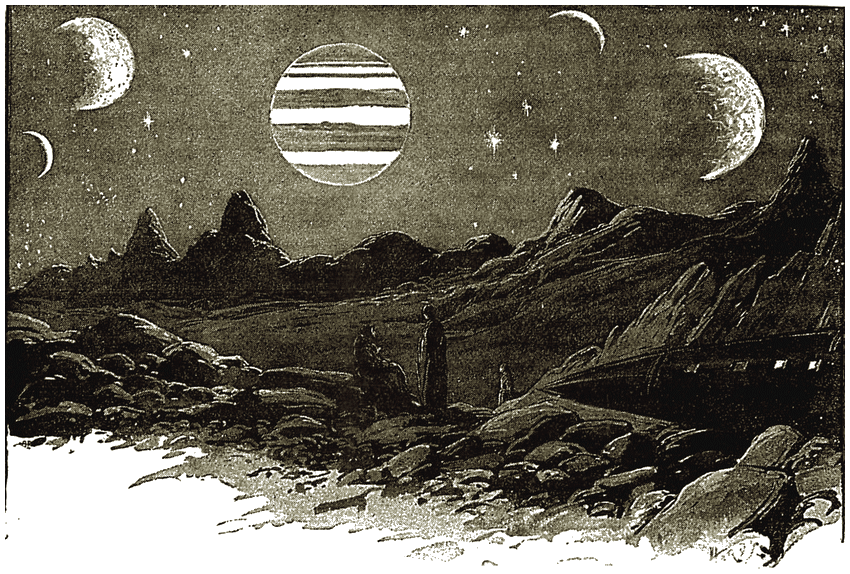
What a strange scene was then opened to our wondering eyes!
There overhead, in all his majesty, belted round his grand equator with four vast belts, was glorious Jupiter, more than a hundred times the size of your full moon. He shone superbly in the heavens, giving many times the light of the moon upon the earth. But besides that, there was real moonlight there, and moonlight not only brighter, but more varied than that of earth. The parent moon of the moonlet, being so much nearer, shone with a splendour little less than Jupiter himself.. Then there were the three other distant moons, each as grand as earth's moon in varied phases—one a crescent, another & half-moon, and a third in the full.
We rested in silent contemplation of the glorious sight. Then one of my comrades broke the silence:
"How wonderful and glorious are God's works! Here in this little world, where everything is so small on its surface, what glories are manifested in its heavens! Let us wait here, and watch the changing phases of Jupiter and his moons."
If the first sight was wonderful, the successive changes we beheld was like a colossal pyrotechnic display, but one which has gone on for countless ages. Slowly each moon passed through its phases, and slowly its dark portions grew enlightened, and then faded away into the darkness. Slowly even huge Jupiter himself assumed the gibbous, the half-moon, and the crescent forms. No hour was quite like its predecessor. All changed their phases far more rapidly than the earth's moon does; and so one felt the changes and the grand solemn motion of those orbs in space. It was as a colossal orrery.
Not only the forms, but the colours varied, for the moons were not all of one colour. Sometimes the silver light of the planet prevailed, sometimes the great blue moon shone over all—shining as a blue light dominating all; sometimes this was varied in shady places by the red, and sometimes by the yellow moon. It was a glorious spectacle—the like of which the eye of man has never rested on. The starry heavens were ornamented with mighty orbs moving visibly in space, enlightening the little world with more than moonlight of divers colours, but only suffering the stars of the first magnitude to be seen.
Eclipses were constantly varying the sky; sometimes the great moon itself was eclipsed by mighty Jupiter, sometimes its lesser comrades came near, and then the change of shapes was wonderful, from full to half, and then to crescent, and then the darkened orbs—just visible in the sky by Jupiter light.
Day was almost as wonderful as night. The sun, though weak in comparison to what you know on earth, still shone brightly enough to drown the other lights, but yet the mighty orbs were more clearly visible in the heavens than the moon is on a sunny day.
We walked over this little world in every part. It was a strange sensation to walk from day into night (only a few miles were sufficient to do it), and then into light, or rather into variegated Jupiter light and moonlight again, to make a short excursion from the North Pole to the equator, and to feel all the time the constant rotation of the tiny world.
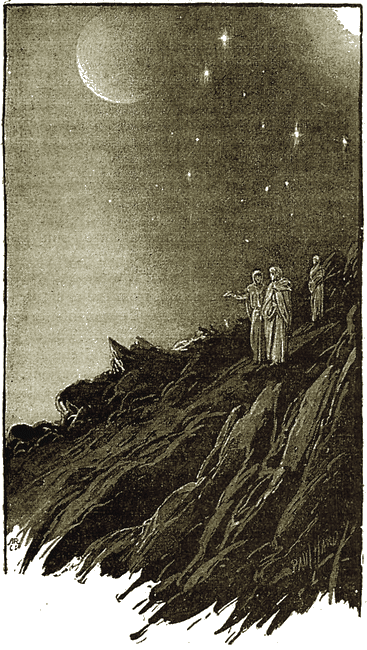
It was a strange sensation to walk from day into night.
Some of the walks over rock and gorge and gulley would to men on earth have been trying, but were less so to us, although there was no atmosphere for flight. The pull also of extraneous gravitation—i.e., the pull upwards of the parent moon and of huge Jupiter himself—made one feel light, and one could leap over lofty obstacles and rocks. Every part of the little world was soon explored, and then we rested on our plain, and watched the magnificent spectacle of the heavens and the huge orbs, ever changing in form, rolling above us. How marvellous they seemed in their grandeur!
We dwelt many days on this little world, and contemplated its scenes. Its surface contained few wonders. Life had been there, but it was gone, and only barren rocks varied its surface. It must have been a strange life in a world so tiny and so light in its gravitating power. But it had passed away, and now the little world was a desert.
At length we held a consultation on our plain. More time had been spent here than we could well spare on our long voyage through the wonders of the solar system, but the superb spectacles of that wondrous varied moonlight had fascinated us. We decided now, after a rest of some twelve of earth's days, to launch forth into space again, and to behold God's many wondrous works in other greater worlds beyond. So we mounted our ether ship, and again darted forth into space to behold Creation's marvels in the vast Universe beyond.
Aleriel
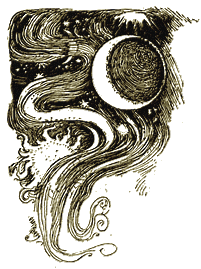
NE morning when the post came in, one of my letters struck me as strange. It bore the postmark of "Tobolsk," in Siberia, and had a Russian stamp. I opened it. The contents were curious indeed, for they mainly came from a region far more remote than Tobolsk. The letter was written on a green tissue, such as I had known Aleriel to use, and at the head were these words in English:—
I, Selauriar, a child of another world, send this to you, commissioned by my friend Aleriel, and a wanderer from another world resting for awhile in earth's Arctic realms—I greet thee.
Selauriar.
Underneath, on green tissue, was inscribed in Aleriel's peculiar, but to me well-known, hand, these words:—
Mount Asoniar,
The Banks of the Ganges,
In the World of Mars.
I am told by one who came from earth but recently, and who
has brought to me and my comrades, who for awhile are resting
here in this Ganges realm of Mars, the news that mankind are
beginning now to wish to communicate with their fellow creatures
in other worlds. It is a natural feeling. When you know they
exist, and that life is not confined to one tiny world in space,
which to the vast whole is but as a grain of sand to the ocean's
shore, you must wish to know something of your brethren in other
worlds—at least, in the worlds near you. The sentiment
that animated the founder of the great Observatory of
California, and which has now moved somebody in Europe to make a
bequest for this object, is one which is most natural in
rational beings.
However, there are difficulties in the way. The distance from earth to the nearest habitable globes is very great. Man can hardly rise to the summit of earth's loftiest mountains; and while men are discussing whether human life could be maintained upon the top even of Mount Everest, in the Himalayas, it might seem presumption to aim at communicating with worlds many millions of miles distant.
Sound is impossible as a mode of communication, for though Pythagoras dreamt in the days of old about the "music of the spheres," in interplanetary space there is an eternal silence—for there is no air to convey sound.
But sight—the appreciation of light through interplanetary ether—is a sense which traverses all space, even to the remotest nebulae. To sight alone can you look for aid.
But supposing sight is available—still supposing the rational intelligences of the solar system are no further advanced than mankind is—even that will be hardly sufficient. It is only by the best instruments of Earth that the canals of Mars or the mountains of Venus can be seen. The unaided human eye can only see bright stars, the highest skill of man can imperfectly discern the markings on their surfaces. The assumption in the whole proposal of intercommunication with the intelligences of other worlds implies that they are superior to mankind.
And does not the wonderful canalisation of Mars—the huge inlets, as it were, straight and parallel on that world—going in one direct line for hundreds of miles for the advantage of the inhabitants and for the irrigation of their territory, encourage you to the theory that in Mars at least—an older world than yours—civilisation and knowledge and control of natural forces may be greater than it is on earth?
Assuming this—that there are beings in the solar system equal or superior in knowledge and power to man, who wish to receive from this earth a message from mankind—how shall it be sent them?
The suggestion that buildings of geometric forms should be constructed on some plain is manifesfcly absurd. It would imply that the inhabitants of other planets are as superior to mankind as man now is to the savages of the Stone period. And then, if they could see such forms, and wanted to reply, they would reply by signals as minute, utterly beyond the power of earth's mightiest telescopes to descry.
Probably the one way is that which I used upon earth, the lighting of a large surface of the sea or land with coloured lights in geometric forms. The power of reflectors on your best lighthouses shows how great the power of man is already to light up a large tract of sea. But the blue colour of the water is unfavourable. The lighting up of a large plain clad in winter snow by night with reflectors from electric-arc lights would be effective. Suppose, for instance, on the Rigi such lamps were fixed, and turned on snows beneath; or better still, perhaps, from the Malvern Hills when snow falls on the Midlands, a large space might be lighted up at night in a geometrical figure.
You will require not a small space, but several square miles to be thus lighted up. You know that Phobos and Demos, the tiny moons of Mars, have hardly so large a diameter as Greater London; Thus the lights of London and Paris have long been seen by the astronomers of Mars.
But the question is: If a signal is given, how shall it be made quite distinct from natural objects, so that those who looked on it millions of miles away would see at once that it was artificial, and not natural? The proposal that the first figure should be the forty-seventh proposition of the First Book of Euclid is a good one. That is manifestly artificial, and would not be likely to result from natural causes. But a simple Latin or Greek cross would do still better. It is not a natural form, and one easier to discern than the complex forty-seventh proposition of Euclid.
The cross is also an easy design to form by electric lights. All you have to do is to form a series of powerful arc flash-lights with reflectors turned on a snowy surface or on a lake in a line north and south (the true north would be best, as it would show design), and then a cross series at right angles. This would produce an effect on the dark side of the earth such as one can hardly suppose, would be produced exactly by natural forces anywhere in the solar system. It would, to the whole of the intelligences capable of observing it, demonstrate itself as artificial—not a product of natural laws, which work usually in different ways, according to laws of evolution, and not with mathematical exactness. Flash lights would be useful. Alternate light and darkness every ten minutes could not be a result of natural laws. They would manifestly be artificial..
When the illuminated cross was formed it should be repeated for several nights, perhaps for weeks. At the same time, careful observations should be made of the red plains of Mars about the canal region and on the mountain-lands of Venus, which are opened to human sight while the plains are clad with clouds.
If there, or elsewhere in the solar system, a cross similar to yours, with its head toward the north pole of the planet, should appear, you would have fair prima facie evidence that in that world at least intelligences similar to man, or superior to him, exist. I would hot advise you merely to look at Mars and Venus, though I do not anticipate you have much reason to expect any answer save in the nearest worlds of your own order: belonging to the inner group of worlds of which the earth is the largest.
If a reply did appear, the question is: What should the next signal be? The first was merely to attract attention, the next should dispel all doubts. But the point is: What common idea has mankind with the inhabitants of other worlds?
In all communications we must proceed from the known to the unknown. What symbol would do? The first idea which they must have if they be rational, and which man also has, is the form of your own world. Form a circle of white light of about fifteen or twenty miles diameter. In it place—in tracings of green light—outlines of the continents and large islands of one of your hemispheres. The representation of the earth itself in miniature would, appear thus on one disc of your planet. Then see (supposing intelligences like men exist) what would be the reply.. Would it be the representation of earth as it looks to them, or a map of their own world? Should either appear, then the existence of these intelligences, either equal to or superior to man, would be established with almost mathematical certainty.
One of the first symbols you should give them, if this were achieved, would be the representation of a man—the tracing of a human figure, either man or woman—in an outline of electric arc lights. This would show them of what form humanity was, and probably they would reply in the same place, with their own forms: thus you would learn something you never could gain by augmenting your telescopes a thousand-fold, i.e., the physical appearance of the intelligences of the other worlds of the solar system.
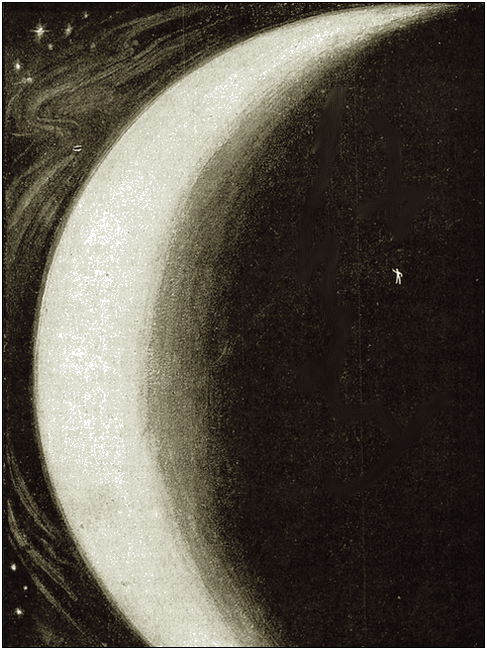
Ouline of the human figure as seen from Mars.
It seems to me that we have more hope of seeing mankind undertake this great enterprise in America than in Europe. You Europeans are too occupied with your vast armaments for mutual destruction to care to devote much cost or trouble to communicating with neighbouring planets. It may be an interesting, but it would be thought an unprofitable enterprise. But in America, with the memories of the Columbus centenary before men's minds, it is just possible that some enterprising Americans might catch the fire of the genius of Columbus, and launch forth the rays of light into space that should reveal (if they exist) the peoples of other worlds. Men called the Continent which Columbus opened up a "New World." It is not so. It is only part of a hemisphere of the earth.
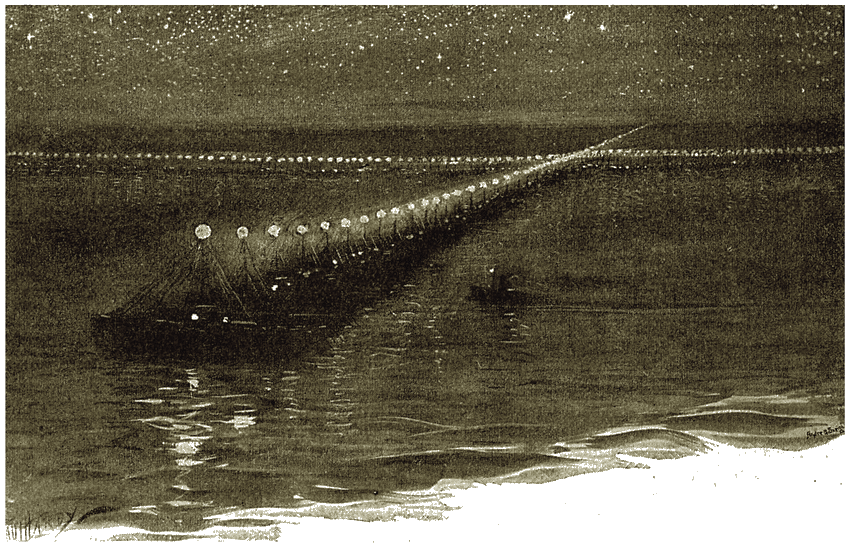
The first signal from Lake Michigan.
But this would truly reveal to you a new world, and tell you more about the universe than any improvement of the telescope could reveal. It is intellectually in one way a grander work than that of Columbus, though not likely to have such material results. Could it be tried at the Chicago Exhibition? If the snow be not then available, the waters of Lake Michigan might be lighted up. What nobler spectacle than that of the forming such a display of electric lights on light-ships, moored in a cross form on Lake Michigan, striving, on the occasion of the exhibition, to communicate with the planets, in the presence of myriads of earth's denizens assembled there to celebrate the centenary of the opening up of a new hemisphere to human civilisation? Man progresses in four centuries from communicating with the Western Continent to communicating with another world.
Aleriel
Roy Glashan's Library
Non sibi sed omnibus
Go to Home Page
This work is out of copyright in countries with a copyright
period of 70 years or less, after the year of the author's death.
If it is under copyright in your country of residence,
do not download or redistribute this file.
Original content added by RGL (e.g., introductions, notes,
RGL covers) is proprietary and protected by copyright.